A partnership is a type of business organisation where two or more people work together to manage and run a company in accordance with the conditions and objectives outlined in the partnership deed. Small and medium sized firms (SMEs) in the unorganised sectors frequently register as partnerships since it is a reasonably simple process. Legalraasta is used to register partnerships.You must first decide on a company name and then create a partnership deed in order to register a partnership. It is a written contract that outlines the partners' respective rights and obligations; for it to be valid, it must not be oral. The Indian Partnership Act, 1932 may be violated or the terms of the Partnership Deed modified to better serve the interests of the partners, but if the Partnership Deed is silent on any matter, the Act's provisions will take precedence.
An agreement between two or more people to conduct business results in a partnership. This pact may be expressed verbally or in writing. According to Section 5 of the Partnership Act of 1932, "the relation of partnership originates from contract and not from status."
A partnership is established to operate a business. According to the Partnership Act of 1932 [Section 2(6)], every trade, occupation, and profession is considered a "Business." Of course, doing business must be legal.
Earning and sharing profits should be the goal of any collaboration. In the absence of a written agreement, the partner should distribute profits (and losses) equally.
A contract for managing the firm is signed by the person joining the partnership. The Partnership Act states that a partnership relationship develops out of a contract rather than a status. Contracts can be made orally or in writing, although written agreements are more common because they make it easier to resolve disagreements down the road.
Partners are held to the same standards of responsibility as a lone entrepreneur. Partners are both individually and jointly liable. In cases when the firm's assets are insufficient, the creditors have the authority to collect the firm's debts from one or all of the partners' personal property.
According to the Act, registering a partnership firm is not required. The "partnership deed" is the sole legal document—or simply verbal agreement among partners—necessary to formally establish a partnership.
Without the approval of the other partners, no partner may assign or transfer his or her ownership interest to another person in order to add that person as a partner in the company.
The partners in a firm have limitless liability, just like a solo proprietor does. In the event of an obligation, not only the assets of the partnership but also the private property of the partners may be used to satisfy the firm's debts to third parties. Any partner or every partner may be held liable for the debts owed by the creditors. Both the couples individually and jointly bear responsibility.
Without the other partners' approval, no partner may sell or transfer his or her share to a third party. Any partner may file a notice of dissolution of the firm if he or she decides they do not want to continue as a partnership.
Even though a partnership deed can be spoken, it is usually written to prevent future disputes. The partners must all sign the partnership deed, which is written on judicial stamp paper that is obtained from the appropriate State Registrar Office. It outlines the partners' and the company's obligations.

Partnership at Will and Particular Partnership are the two forms of partnerships that are most common in India.
The amount of time needed to register a partnership firm in India ranges from 14 to 16 working days.
No, registration of a partnership firm is not required in India. However, it is usually desirable to register as registered partnership firms have access to a number of unique rights that unregistered partnership firms do not.
The benefits of a partnership firm in India include ease of starting, decision-making, raising capital, a sense of ownership, easy management free from conflicts, fewer compliances, inexpensive establishment, minimal legal obligations, flexibility, and tax advantages.
In India, the benefits of a partnership firm include ease of starting, decision-making, raising capital, a sense of ownership, easy management without conflicts, less compliances, low establishment costs, little legal obligations, flexibility, and tax advantages.